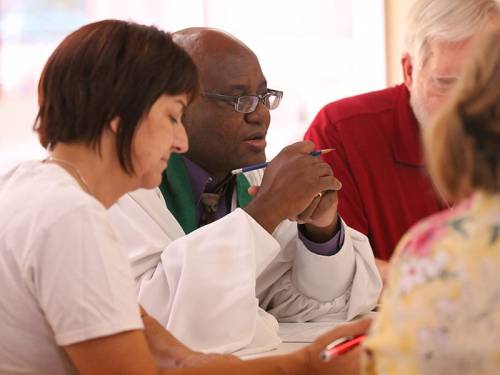Mentoring today fills tomorrow’s pulpits
October 9, 2018

As the Rev. Bobby Musengwa leads his flock, he keeps his eyes open to those who are being called to ministry. He takes notice of the gifts in others and nurtures those gifts, just as he was once nurtured. Courtesy of Lee Hinson-Hasty
Growing up in South Africa, Bobby Musengwa couldn’t imagine coming to America to attend seminary. But it was his uncle’s friendship with Heath Rada, who later served as moderator of the 221st General Assembly (2014), that brought this possibility to light for him — and the mentoring community of professors, pastors, family and friends reinforced Musengwa’s call.
Musengwa soon found himself in the U.S., encouraged by his family to leave South Africa amid growing concerns about his safety in apartheid South Africa. He attended and graduated from St. Andrews Presbyterian College (now St. Andrews University) in Laurinburg, North Carolina, and worked at Montreat Conference Center each summer. That’s where he reconnected with Rada, who then invited him to attend the Presbyterian School of Christian Education (now part of Union Presbyterian Seminary).
“He became a mentor that allowed me to safely explore the journey or the call into ministry,” Musengwa recalled. “I had in my mind that I’m just an educator.”
Musengwa did serve as a Christian educator, but Rada and others encouraged him to pursue ordination as a pastor. “Heath taught me that I could be an educator, a teaching elder even, as a pastor.” Musengwa earned degrees from Princeton Theological Seminary. He now serves as the “Rev.” of Maximo Presbyterian Church in St. Petersburg, Florida. This is the third church he has served.
Mentoring for ministry has an increasingly important role in today’s Presbyterian Church (U.S.A.). Over the past decade, there have been about 500 pastor retirements each year and only 200 ordinations. That trend will continue until mentoring those called to pastoral ministry becomes a priority for Presbyterians.
Will we have enough pastors to fill the needs of Christ’s future Church? The answer is up to us. And although some geographical regions have enough pastors now, there are not nearly enough to meet the needs in many other areas.
Sharon Daloz Parks, a faith development expert and director of Leadership for the New Commons, an organization in Clinton, Washington, that provides consulting services in the areas of leadership and ethics, believes that a mentoring environment and culture are essential for anyone, and especially young adults, to discover their vocation. In her book Big Questions, Worthy Dreams: Mentoring Young Adults in Their Search for Meaning, Purpose, and Faith, Parks writes that mentoring environments provide a “network of belonging … [and] promise a place of nurture for the potential self.”
Families, churches and even worksites can be mentoring environments, networks of belonging or mentoring communities. A whole community of mentors may already exist with the potential to nurture Christian vocational discernment. That potential is realized when gifts are identified, and intentional discernment of gifts begins. That can start with the mentor or the mentee.
We are not alone in the church as we discern what God wants us to do with our lives. All that we have, including our lives, is entrusted to the care of the community most often embodied in congregations.
I’ll never forget a college student in the first congregation I served. He began the process of discerning a call to ministry as what we call an “inquirer” by meeting with me and then our session. Later he would meet with the presbytery. The new inquirer asked the session for their support in finding out how to use his gifts best as a person of faith to make a positive difference in the church and the world. He trusted me, and he trusted them.
After the meeting, the newly recommended inquirer and I privately debriefed the session meeting in the church parking lot. Feeling truly supported, the inquirer suggested, “Wouldn’t it be great if every youth at our church had the support I am getting?” With a lump in my throat, I managed to whisper back, “Wouldn’t it be great.”
Our seminaries stand ready to prepare those with gifts for ministry for service in the church. We don’t have to wait to enroll or send someone to seminary to partner with them. The admissions staff serve as gifted members of a discernment team. Don’t wait until you or someone you know is called to seminary to contact one or more admission officers.
Lee Hinson-Hasty, Senior Director, Theological Education Funds Development, Presbyterian Foundation
Today’s Focus: Mentoring
Let us join in prayer for:
PC(USA) Agencies’ Staff
Laurie Anderson, PMA
Monty Anderson, PPC
Let us pray:
God of creation, you make all things new. Teach us to shed that which inhibits us from seeking your justice and peace. Fill us with courage to explore questions of faith. As you call your church to emerge into new ways of loving each other, remind us that no matter which new road we tread, you have already walked it, and we but follow in Christ’s footsteps. Amen.
Daily Readings
Morning Psalms 42; 146
First Reading Hosea 7:8-16
Second Reading Acts 23:12-24
Gospel Reading Luke 7:1-17
Evening Psalms 102; 133
![]() You may freely reuse and distribute this article in its entirety for non-commercial purposes in any medium. Please include author attribution, photography credits, and a link to the original article. This work is licensed under a Creative Commons Attribution-NonCommercial-NoDeratives 4.0 International License.
You may freely reuse and distribute this article in its entirety for non-commercial purposes in any medium. Please include author attribution, photography credits, and a link to the original article. This work is licensed under a Creative Commons Attribution-NonCommercial-NoDeratives 4.0 International License.